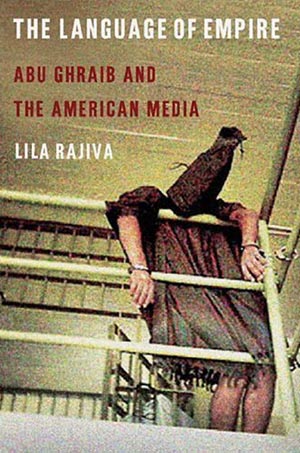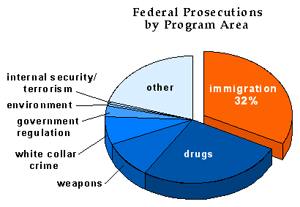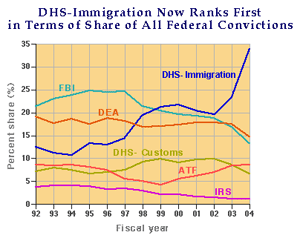Baltimore resident Lila Rajiva is the author of The Language of Empire: Abu Ghraib and the American Media (Monthly Review Press, 2005). She has taught at the University of Maryland and is a prolific freelance journalist, whose work can be found on web publications, including CounterPunch, Dissident Voice, and MRZine. Following her West Coast book tour in mid-December, Lila Rajiva is available to speak to your group. Contact Martin Paddio at <[email protected]>.
SS: Keeping up with the scandals of U.S. corporate journalism — originating in its role as a service provider to the nation’s ruling class — is no small task these days. Explain the subject matter of your new book, The Language of Empire: Abu Ghraib and the American Media (Monthly Review Press 2005), in the context of mass media corruption.
LR: Yes, it’s a tremendous task. But fortunately there are a lot of people trying to keep the media honest these days and it’s having an effect.
I think the way the Iraqi detainee torture scandal was covered — which is the subject of my book — is a perfect example. There were actually reports on torture right from the start, right after 9-11. But it didn’t become a mainstream “story” until three years later, after the CBS report in late April 2004. Then, what you had was a flurry of reports, accurate enough as they went, but never presented with the kind of historical and political context that would allow people to recognize what was happening for what it really was. Instead, it was passed off in the usual way as a case of a few bad apples, a procedural error, a failure of communications. It was about low-level wrongdoings by a few perverts who would be justly punished. That of course lets the average viewer think things have been taken care of and they can switch off. Which they did. The torture story went on the back burner for a whole year. It was only alternative journalists and activists and a few, a very few mainstream reporters who kept it alive. Now, of course it’s back in the news in a big way with the revelation of details about hundreds of illegal rendition flights all over Europe. But I want to go out on a limb and suggest that unless reporters start presenting the material with more context, the new revelations might end up going the same way as what surfaced earlier.
SS: The current trial of Saddam Hussein for crimes against humanity is headline news in the American press. How does the history of his regime connect with Iraqi prisoner torture under U.S. occupation?
LR: There could be no greater irony and hypocrisy than the picture of Saddam Hussein being tried for crimes against humanity — and his crimes were without doubt heinous — by an administration that has wrought the kind of carnage and senseless destruction in Iraq that the Bush administration has, and by different modalities, the previous administration as well. Hussein tortured people, no question. But by all accounts, the current Iraqi government is doing worse in that department. And we have increasing confirmation that the U.S. too has a policy of torture, both direct and by proxy. So, yes. Hussein deserves to face his many crimes. But you’ll notice that several of the ones most publicized before the war have now vanished from the dossier. Perhaps U.S. complicity and even tacit approval of some of Saddam’s worst offenses would be too embarrassing to have dragged out into the glare.
Now, some have made the case that what took place at Abu Ghraib in Baghdad and the scores of other U.S. detention sites scattered throughout Iraq, Afghanistan, Cuba and elsewhere was exceptional and was not torture but abuse. Hearing about the rape and mutilation practiced by Saddam’s secret police, there are those who are going to make the argument that Saddam’s practices were worse and justify our own.
I want to strongly condemn that move. In the first place, it’s morally untenable to argue for an immoral and illegal practice on the basis that others do it. But even the substance of the argument is mistaken. As a matter of record, the U.S. has committed acts which cannot be dismissed as mere abuse. This is not a matter only of men being forced to wear panties. Such humiliating practices certainly did take place and they certainly do constitute abuse forbidden under the Geneva Conventions. But they operated on the side of and as a cover for much more traumatic physical and psychological torture that included simulated (and sometimes real) drowning, severe beating and kicking that resulted in death, rape, sodomy, asphyxiation, mock and real executions, threats (and in some cases attacks) with dogs, prolonged confinement in very cramped filthy metal cages, prolonged exposure to extreme heat and cold, prolonged isolation and deprivation of sleep and adequate nutrition, extreme stress positions that led to physical impairment and injury, savage religious taunting and desecration of religious texts and objects. The American Civil Liberties Union reports cite dozens of autopsies of prisoners who died from U.S. interrogations. And those are only the ones that got an autopsy. There is evidence to suggest that many deaths were just passed off as due to natural causes. But even with all the furor over prisoner rendition (kidnapping) flights, this ACLU report has simply been buried in the inside pages by the corporate media. So there is no context in which to understand what is really taking place. And if you don’t have the context, then the government is always going to be able to wiggle out with promises about fixing a broken policy. Well no, the policy’s not broken. This is the policy. This is how it works. The U.S. is torturing prisoners by the common definition of such things even in known American sites.
But we’re also dealing with a system of covert and proxy torture. The recent case of Khaled El-Masri, a German citizen abducted from Macedonia and tortured in Afghanistan by both Afghans and apparently Americans, gives you a hint about the hidden world of which Abu Ghraib is only the visible tip. These extraordinary renditions, as they are called, were put into place during the Clinton administration and have now grown like a cancer under Bush. “Rendered” prisoners charge that they have been tortured in Egypt, Jordan, and Syria. The actual list of countries is certainly much more extensive. By the way, I want to emphasize that I used the word “charge” to cover myself and not because I think the detainees’ allegations are in any way unsupported.
So, yes. Try Hussein for crimes against humanity by all means. But what would you call these U.S. practices? Crimes against the inanimate world?
|
ADULT CORRECTIONAL POPULATIONS, 1980-2004
(Click on the image for a larger view.) 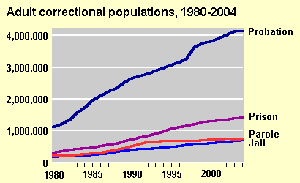 SOURCE: Bureau of Justice Statistics, “Correctional Population Trends” (2 November 2005) TEN LEADING NATIONS IN INCARCERATION RATES (Click on the image for a larger view.) 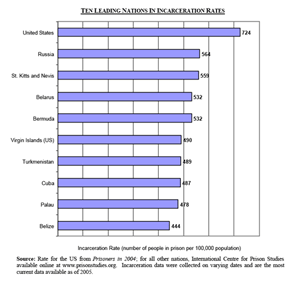 SOURCE: The Sentencing Project, “New Incarceration Figures: Growth in Population Continues” (November 2005), p. 4 |
SS: The U.S. government is the world leader in locking up its citizens, mostly black and brown people. How does this trend relate to U.S. foreign policy after 9-11?
LR: There is continuity between the state of affairs before 9-11 and after. That continuity is obscured by the category of “foreign policy.” When you talk about foreign and domestic policies separately — and of course, for clarity, you often have to — and when you talk about foreign policy in traditional terms, such as national security, vital interests, power and so on, then you can miss the seamless way in which the detention of suspects in this new so-called war on terror is simply an expansion and acceleration in a very open way of domestic incarceration policies.
It’s widely known that the US locks up people at a much higher rate than any country in Europe. It is less known that it locks up people at a higher rate than China, which most would call a repressive society. Yes, it’s we, not the Chinese, who lead the world in imprisonment. And the crimes that people are locked up for are increasingly non-violent crimes. More and more it is for such things as petty drug possession offenses. And the brunt of those policies fall on blacks and browns — specifically African-Americans and Hispanics. More specifically on young African-American males. If you compare South Africa under apartheid with the US today, we lock up African-Americans at much higher rates. Consider also the high rates of recidivism among prisoners, their political disenfranchisement, the horrendous rates of sexual assault including male rape in prisons, the explosion of prison building, the privatization of many aspects of incarceration and the growth of what some have called the prison-industrial complex — place these developments over the last 10-15 years against what we observe in the current prison torture scandal, and things become quite clear. We have the same explosion of prison building — this time abroad, this time covert — the same tales of sexual abuse and assault, the same tales of torturous or abusive treatment, the same privatization, the same creation of a “grey zone” in which prisoners no longer have a clear legal status to protect them. The vote deprivation on the domestic front is matched by the rights deprivation in the war on terror.
And again, while the language used is vague — after all, how does one declare a war on an abstract noun — we know who we mean. Muslims are the targeted group. But here again, race enters the picture. Terrorism is Muslim and Muslims are conflated with brown people. In the US, since 9-11, attacks against Hindus, Sikhs, Native Americans, and Hispanics have all increased, telling us that Muslim easily and quickly morphs into colored or immigrant.
|
DHS-IMMIGRATION REFERRALS FOR PROSECUTION UP SHARPLY
(Click on the image for a larger view.) 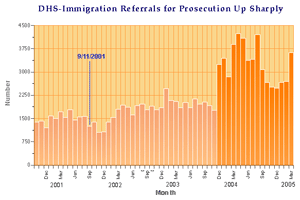
FEDERAL PROSECUTIONS BY PROGRAM AREA DHS-IMMIGRATION NOW RANKS FIRST IN TERMS OF SHARE OF ALL FEDERAL CONVICTIONS “Fueled by the jump in DHS-immigration referrals in FY 2004, immigration matters now represent the single largest group of all federal prosecutions, about one third (32%) of the total. By comparison, narcotics and drugs, for many years the government’s dominant enforcement interest, dropped to about a quarter of the total (27%) and weapons matters to slightly less than one out of ten (9%)” (Transactional Records Access Clearinghouse, “Immigration Enforcement,” 2005).
|
That is why immigration control so quickly tied into the war on terror. Now, there is certainly a very legitimate need to have immigration take place in a lawful and ordered way, giving local communities the time to adjust. There is no denying that. There is no denying also that there is room and need for a serious debate on many of the cultural assumptions and the economic impact of immigration.
There is need for analysis of crime and immigration. But even granting all that, you see post 9-11 that immigrants, especially those who have violated immigration law in some way, were quickly targeted in a really haphazard way. For instance, 1,200 Middle Eastern immigrants nationwide were picked up by the Immigration and Naturalization service which is now under the Homeland Security Department. Some of them were not even Muslim — there was a Hindu, a Sikh, and even some Middle Eastern Jews. They imprisoned 84 of these detainees at the Metropolitan Detention Center in Brooklyn, some for months under a so-called “hold until cleared” policy, which permitted Muslim and Arab non-citizens to be arrested and held in custody until cleared by the FBI.
What you are talking about is a street sweep based on nothing more than a tip from a bystander. So for a minor visa problem, you had people put into maximum security isolation jail cells as high value suspects, held for 23 out of 24 hours in solitary confinement, subjected to strip searches in front of the opposite sex, rectal searches, beatings, exposure to cold. And this is a matter of videotaped record. This is Abu Ghraib at home. And in this regard, don’t forget that Michael Chertoff who as head of the criminal division of the Dept. of Justice authorized the Bybee torture memo is in charge of Homeland Security. That says much just there.
SS: Christian fundamentalism informs the language of war against global terror under the Bush White House. How was this used to personalize and minimize the torture of Iraqis in Abu Ghraib?
LR: Overtly at least, President Bush has gone out of his way to emphasize that this is not a war on Islam. He has had Ramadan celebrations in the White House, for instance. And now, the latest bit of trivia is that the new White House Christmas Cards have been secularized — which is upsetting to some part of his Christian supporters.
I think at the unofficial level, however, there is manipulation of imagery to suggest a Christian versus Muslim conflict. But it is usually couched in public as a civilizational rather than a religious conflict. Islamic states are “failed states,” Islamic culture is anti-modern, and so on. The rhetoric is that Islam needs up-dating, modernizing. It needs an Enlightenment. Which is odd, of course, considering that the people who are wielding this rhetoric of modernization are busy trying to push intelligent design into science curricula. And considering that it was US apparatchiks like Zbigniew Brzezinski who actively sponsored the most regressive elements in Islam in a Cold War strategy intended to bait and break up the Soviet Union.
The ideologues of this imperial project — people like Samuel Huntington, Francis Fukuyama (who has jumped ship since then), Bernard Lewis, Niall Fergusson, Max Boot, Dinesh D’Souza — are not Christian fundamentalists at all. They are Anglophile cultural critics, apologists for the civilizing mission of the American Empire, which they see as a worthy successor to the British empire. What we have is nostalgia for the mission civilisatrice — as the French call it — a feeling that the world needs some supreme state to whip it into shape.
But that is in the public debate. In a multiethnic country like America, you can’t really use divisive religious rhetoric in public too obviously. However, it’s a different story at the unofficial level. At the level of the media environment, at the level of individuals, you have people like General Boykin in charge of special ops training who do indeed consider the enemy to be Islam, who view Allah as a pagan [sic] God, who see the war on terror as a battle against Satan and his minions. You have Pat Robertson, Jerry Falwell, Franklin Graham, and the evangelists of the 10/40 Window — which is a reference to the countries between 10 and 40 degrees latitude which are regarded as ripe for evangelizing — who do indeed see the world in need of conversion to their brand of Christianity. You have Hal Lindsey, the author of the sensational best seller, The Late Great Planet Earth, and Jack Van Impe, who all preach a very apocalyptic doctrine of a Christian — Muslim armageddon in the near future. That is of course also conflated with capitalist-communist war.
Furthermore, when you examine the actual practices used in detention, then there is clear evidence of anti-Muslim feeling, which is also very much overlaid with racism. Some detainees had their heads shaved in a cross, the Koran was desecrated, there was sexual taunting, rape, and abuse specifically intended to humiliate Muslim men; there was forced shaving of beards, there was the use of dogs which would be especially abhorrent to pious Muslims. When guards — like Charles Graner — and some of the prison bureaucrats in charge of detention in Iraq are themselves religious bigots, one should not be surprised to find an element of religious persecution in the treatment accorded to Iraqis.
But I must add here that there is also considerable evidence of Jewish fundamentalism — something that is not talked of as much. One of the principal figures in the detention scandal, who has not even entered the public debate, was Douglas Feith, a hard-line Zionist whose views are in no way different from Jewish zealots in Israel. Little has been said of Feith or Paul Wolfowitz or Richard Perle from the standpoint of their religious beliefs, although that would be illuminating. Groups like Aish Ha Torah and the Lubavitch Hasidic, who wield quite a bit of influence on the pro-Israeli lobby here, are never mentioned. They need to be. That would let us see that US policies in Iraq bear a close resemblance to Israeli policies in the Occupied Territories, even to the specific types of torture used. And it is well known that US forces underwent training in Israel to study urban warfare tactics used by the IDF in Jenin and other places and that Israeli personnel were to be seen, allegedly, at Abu Ghraib.
But finally I do also want to emphasize that it is not fundamentalism as such in either of these two religions — and I speak as a very liberal and unorthodox Christian — that is the problem. It is certain highly political varieties of fundamentalism.
SS: When and how did you become a radical? What and/or who motivated you to write The Language of Empire?
LR: I have always been interested in propaganda, and since the first Gulf War, I have been simply fascinated with the way the media plays on public sentiment, controls the terms of the debate, and silences certain viewpoints while all the time rejoicing (as Alice would say) in the sobriquet — the “liberal” media. Of course, it is liberal in a certain knee-jerk way on certain social issues and largely because most journalists come out of the same socio-economic and educational background, even if these days they might be of different ethnic heritages. But anyone who watches knows that the shots are called by the corporate bosses, so reportage can never extend to any kind of fundamental questioning of the status quo.
So that was when my interest in the media first arose and it became stronger during the Iraq sanctions period when I was also in graduate school at Johns Hopkins. I did a lot of web activisim — nothing great, just the grunt work of writing letters, signing and circulating petitions, and so on — on behalf of lifting the sanctions, and I became quite impressed by the extraordinary silence about them on campus. I remember organizing an event to bring activists Eric Gustafson and Ellen Barfield to speak and finding it difficult to get much interest, even though Hopkins was actually the place which brought out the report about children’s deaths from the sanctions. Then came the Kosovo war, and I saw how liberals and even progressives who otherwise would consider themselves “doves” suddenly decided that this was a war that they could like. It was shocking to see people swallow naked aggression when it was sugarcoated with multiculturalism and human rights.
Then the Iraq War began to loom. And suddenly signing petitions was not enough. I really had to become involved more overtly. So I started writing, not just on the war but on globalization as well. And slowly a certain picture began to emerge of the way things fit together. So when the first pictures of the torture surfaced, I had already developed quite a bit of immunity to the media — I figured there was more going on than a few bad apples.
I think being a regular media watcher really helps you to anticipate where things are going to go, well before anything concrete surfaces, and that’s just what happened. My first articles on the torture scandal asked the question — why are Iraqi women not in these pictures? That was in June 2004 and people were not talking about women at all. They still aren’t really. After all, we went in to Iraq to save women from Islam, didn’t we? And there were hardly any articles about the rape of women. But there had to be women being raped. It’s simply what happens in war. But the fact that initially no one bothered to pursue that angle — except maybe one paper — told me something about American exceptionalism. About the mind-set that thinks that when we go to war, we do it differently from other people. We don’t kill civilians, or rape, or loot. Naomi Klein put it very well recently when she said that in other countries — I presume she is talking about Europe — when people talk about torture, they say never again; but when we talk about it here, we say never before.
And that’s the attitude I wanted to explore. That’s the kind of blindness that I wanted to talk about. Torture is not new in human society although some of the psychological methods developed probably are. Or they are at least more refined, elaborate, and effective. However, this kind of willed blindness pervading a nation as the result of the technology of mass media has certain elements to it which are probably novel and bear more analysis. Which is what I tried to do in the book. I think mine is the first book on that subject in relation to the torture scandal.
About your first question about becoming a radical. I honestly don’t consider anything I am saying very radical. And I think accepting the position that opposition to aggressive war is radical concedes the whole issue to the right-center consensus.
I think if you look at the war outside the country, the antiwar position is the overwhelming position of responsible, thoughtful, conscientious people. It’s only here that it’s not. And that’s natural — that’s what states do in times of war; they propagandize their home population. It’s a great mistake to think of propaganda as something meant for other people. Its target is first and foremost the domestic front.
So I don’t think my position on the war is radical.
What else do I say in the book that people might construe as radical? That torture has been very American for some time? That’s documented history. It was not part of official policy, but that’s the nature of a democratic state. A number of things can’t go on record officially. But we have done either directly or through our hirelings everything that we consider medieval or barbarous when others do it. Officially, we never use napalm or chemical weapons, we never intentionally target civilians though we cut off water supplies and damage hospitals, we never provoke other countries, we never loot their treasuries, we never bribe or blackmail, we never torture. Or if we do, we do it from necessity and because the other fellow did it first. We are the good empire. If it’s radical to disbelieve the state line on certain issues, then I suppose I am a radical.
In the book I say that torture is a sign of empire. Is that radical? That again is a matter of historical record. All empires and tyrants torture. It grows out of their huge size, their ambition, and their desire to dominate. Because they need to know more and more about their enemies, their friends, the country next door or on the opposite side of the globe. That’s what full-spectrum dominance — the stated goal of American empire — is about. If there’s any available space on planet earth, or in the heavens, or underwater, or underground, or even inside your head, the logic of empire dictates that the corporate-state will want to be there, too. I discuss this in Chapter 7 of the book under the heading of Prometheus. I briefly enunciate the idea that the existence of technologies that can collect extensive, detailed records about everything and everybody dictates that they will use them. First, against foreign enemies or suspects, but inevitably against the population at home. It’s happened that way in every empire. And getting into your head is what torture is all about. It’s really not simply about physical pain alone.
That is why in many ways I have a lot of sympathy for right-libertarians who seem to have more properly estimated the dangers of the police state. So if I am a radical, I am a radical with plenty of company on the right and left.
We are seeing the first, the very first, early signs of a police state in this country. It does not have to go that way if people stand up to it. But the torture scandal cannot be dealt with separately from the impending emergence of a police state. The distortions of the corporate-media cannot be analyzed separately from that emergence.
Perhaps finally, recognizing that certain civil liberties are being eroded, perhaps irrevocably, has made it urgent for me to speak out.
 Seth Sandronsky is a member of Sacramento Area Peace Action and a co-editor of Because People Matter, Sacramento’s progressive paper. He can be reached at <[email protected]>.
Seth Sandronsky is a member of Sacramento Area Peace Action and a co-editor of Because People Matter, Sacramento’s progressive paper. He can be reached at <[email protected]>.

